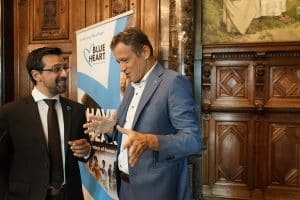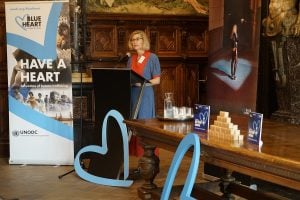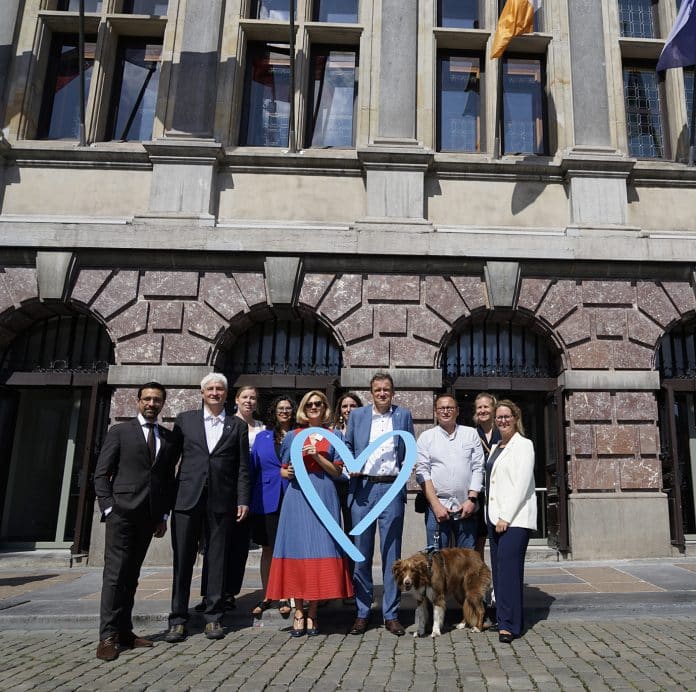“Since 2019, Belgium reports around 100 underage victims of teenage pimping annually. By July 2024, 73 victims of teenage pimps and minors forced into criminal acts had been registered,” notes Inge Saris, Director of Payoke, an anti-trafficking organisation.
The UN’s 10th World Day Against Trafficking in Persons (30 July), focuses on child trafficking’s causes and vulnerabilities. Leading up to this day, the United Nations Office on Drugs and Crime (UNODC) spearheads the Blue Heart Campaign to highlight human trafficking’s impact.

In Belgium, the campaign launched on 22 July in Antwerp featuring key figures like Belgian Justice Minister, Paul Van Tigchelt, and NGOs Sürya, PAG-ASA, and Payoke. UNRIC interviewed these organizations, which support victims and aim to prevent trafficking, in Wallonia, Brussels, and Flanders.
Belgium’s efforts against child trafficking
Despite Belgium’s legal framework, child trafficking persists due to organised crime and socio-economic disparities, such as differences in years of schooling, disparity in job opportunities, or in access to information. A hotline established in 2019 increased reported cases.
In 2023, a parliamentary committee made 100 recommendations to enhance anti-trafficking measures, leading to actions like informational brochures for work visa applicants and financial transaction monitoring to track down on human trafficking. The Federal Judicial Police now leads a European project focused on minor exploitation, and funding for reception centres has increased.
However, enforcing the non-punishment principle for victims remains challenging. “A victim should not be punished for crimes committed under coercion, requiring deep understanding among police and justice partners,” Payoke’s Director Saris explains.
Support for survivors

“Most children are not ‘saved’, instead they fight to escape their situation. Payoke provides medical care, psychosocial and legal support to minors until they are independent and legal procedures are complete,” Saris continues.
Payoke uses risk assessment tools, hotlines, and training programmes to identify at-risk minors early.
Sürya intervenes early by working with front-line services to support sexually exploited children and youth, while PAG-ASA focuses on administrative and legal support for children, administrative and legal support, providing accommodation and psychosocial support once they reach adulthood.
As one of the minors explained to the juvenile judge: “My supervisor is an additional conscience, a sounding board where I can always go for advice. The continuity at Payoke was one of the most important protective factors that helped me escape that environment.”
National and international partnerships
Payoke, Sürya, and PAG-ASA work closely with each other and with local authorities, police services and ChildFocus, a Belgian foundation supporting missing children.
“ChildFocus directs both young people and parents to our service. Youth support or protection services as well as magistrates and police services can contact us 24/7,” notes Christian Meulders, Sürya’s Director.
The three organisations are part of the “national reorientation mechanism”, coordinated by the Belgian Justice Ministry, and partner with the police, social inspection, the public prosecutor’s service and the Immigration Office.
Payoke and PAG-ASA collaborate with LaStrada International, addressing trafficking in Europe, while Sürya provides training in Luxembourg.
Make human trafficking visible

As part of UNODC’s Blue Heart Campaign, over 20 Belgian cities will illuminate town halls in blue on 30 July, and Brussels statue, Manneken Pis, will wear a tailor-made costume. The Belgian campaign promotes a multilingual website “stop human trafficking” and a hotline (078 055 800) for trafficking victims to get information or contact specialised centers.
“Many child victims are not yet reported,” warns PAG-ASA’s Director De Hovre. “More awareness-raising is needed by the Belgian federal and regional authorities
Sürya Director Meulders calls for “genuine commitment to addressing sexual exploitation through national campaigns.”
Urgent needs
Stable funding, comprehensive research, partner training, and targeted policies are crucial. Investments in shelters to prevent child trafficking are essential.
“These children need a safe place away from the networks and people who exploited them, away from their smartphones and social networks that risk plunging them back into exploitation,” De Hovre concludes.
USEFUL LINKS:
- You can report cases at of the three organsiations via stoptraite.be / stop human trafficking
- More activities planned around the World Day Against Trafficking in Persons
The inclusion of an organisation on the United Nations Regional Information Centre (UNRIC) website does not necessarily reflect UNRIC’s views and does not imply its endorsement.

